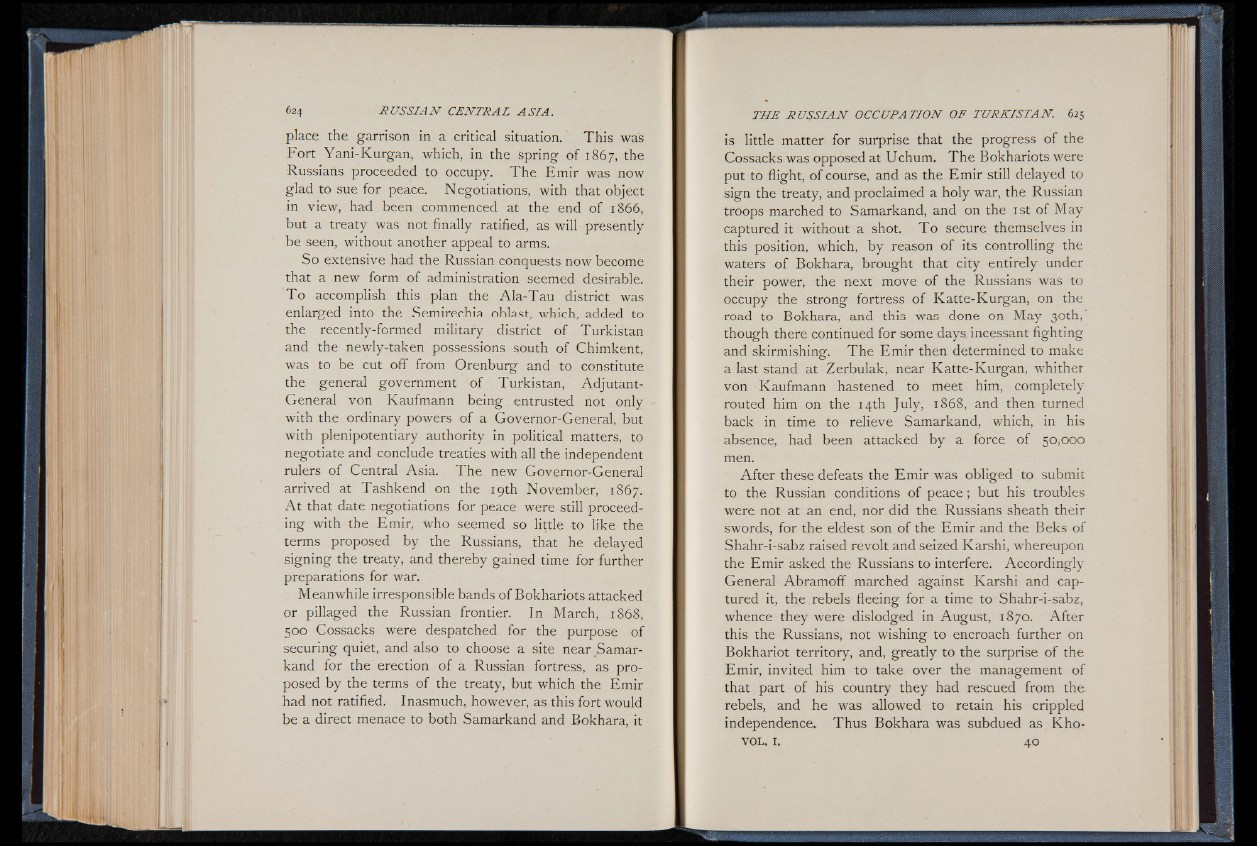
place the garrison in a critical situation. This was
Fort Yani-Kurgan, which, in the spring of 1867, the
Russians proceeded to occupy. The Emir was now
glad to sue for peace. Negotiations, with that object
in view, had been commenced at the end of 1866,
but a treaty was not finally ratified, as will presently
be seen, without another appeal to arms.
So extensive had the Russian conquests now become
that a new form of administration seemed desirable.
T o accomplish this plan the Ala-Tau district was
enlarged into the Semirechia oblast, which, added to
the recently-formed military district of Turkistan
and the newly-taken possessions south of Chimkent,
was to be cut off from Orenburg and to constitute
the general government of Turkistan, Adjutant-
General von Kaufmann being entrusted not only
with the ordinary powers of a Governor-General, but
with plenipotentiary authority in political matters, to
negotiate and conclude treaties with all the independent
rulers of Central Asia. The new Governor-General
arrived at Tashkend on the 19th November, 1867.
A t that date negotiations for peace were still proceeding
with the Emir, who seemed so little to like the
terms proposed by the Russians, that he delayed
signing the treaty, and thereby gained time for further
preparations for war.
Meanwhile irresponsible bands of Bokhariots attacked
or pillaged the Russian frontier. In March, 1868,
500 Cossacks were despatched for the purpose of
securing quiet, and also to choose a site near Samarkand
for the erection of a Russian fortress, as proposed
by the terms of the treaty, but which the Emir
had not ratified. Inasmuch, however, as this fort would
be a direct menace to both Samarkand and Bokhara, it
is little matter for surprise that the progress of the
Cossacks was opposed at Uchum. The Bokhariots were
put to flight, of course, and as the Emir still delayed to
sign the treaty, and proclaimed a holy war, the Russian
troops marched to Samarkand, and on the 1st of May
captured it without a shot. To secure themselves in
this position, which, by reason of its controlling the
waters of Bokhara, brought that city entirely under
their power, the next move of the Russians was to
occupy the strong fortress of Katte-Kurgan, on the
road to Bokhara, and this was done on May 30th,
though there continued for some days incessant fighting
and skirmishing. The Emir then determined to make
a last stand at Zerbulak, near Katte-Kurgan, whither
von Kaufmann hastened to meet him, completely
routed him on the 14th July, 1868, and then turned
back in time to relieve Samarkand, which, in his
absence, had been attacked by a force of 50,000
men.
After these defeats the Emir was obliged to submit
to the Russian conditions of peace; but his troubles
were not at an end, nor did the Russians sheath their
swords, for the eldest son of the Emir and the Beks of
Shahr-i-sabz raised revolt and seized Karshi, whereupon
the Emir asked the Russians to interfere. Accordingly
General Abramoff marched against Karshi and captured
it, the rebels fleeing for a time to Shahr-i-sabz,
whence they were dislodged in August, 1870. After
this the Russians, not wishing to encroach further on
Bokhariot territory, and, greatly to the surprise of the
Emir, invited him to take over the management of
that part of his country they had rescued from the
rebels, and he was allowed to retain his crippled
independence. Thus Bokhara was subdued as Kho*
vol. 1. 40